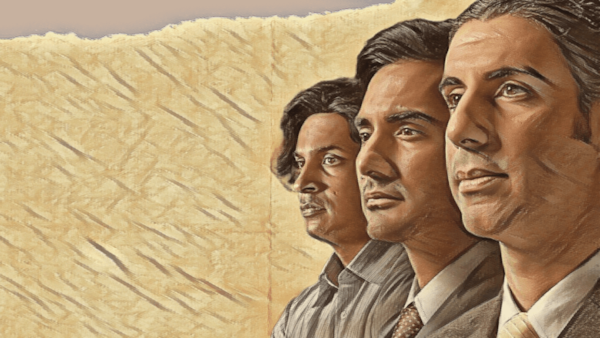How Rocket Boys Season 2 Grounds Its Geniuses
The second season of Rocket Boys builds on the promise of the first

Last Updated: 01.15 PM, Mar 16, 2023
Watch Rocket Boys Season 2 on OTTplay
THERE IS A SCENE in the second season of SonyLiv’s Rocket Boys, where Vikram Sarabhai’s mother reacts to the news of her son and daughter-in-law moving out of their ancestral house. “Acha hai, isse Vikram ko daal aur aate ka bhav toh pta chalega,” she says to Mrinalini, Sarabhai’s wife. It’s a sequence that perfectly illustrates why Rocket Boys is pitch perfect telly. Enmeshed with global political intrigue, a nation on the cusp of social and scientific epiphanies, Rocket Boys has remained committed to the fact that no genius can live without being somewhat upstaged by the intimate and the personal. It’s a creative distinction that the show has successfully made from what could so easily have become a jingoistic celebration of a self-serving version of history. On the contrary, in its second season, Rocket Boys continues to be seductively tranquil and composed despite engaging with high-wire acts like espionage, war and the political firmament India had to learn to contest.
The second season begins with Homi Bhabha, played by the magnetic Jim Sarbh, speaking of a nuclear reactor that he claims is ‘for peaceful purposes only’. Bhabha is obviously onto more than just energy, and the CIA intend to make his ideas their primary focus. At the same time, Sarabhai continues to look upward into space with the exuberant dynamism of a teen. Ishwak Singh is poised and graceful as the more modest of the two life-long friends. Both suffer individual failures in this season and yet both find ways to move past hurdles. Not with the thunderous intervention of cognitive genius, mind you, but quite simply, with the tools of unremarkable endurance. The idea behind this portrayal, thankfully, has never been to attest to their genius, spread it like tomorrow’s advertisement, but merely query and rescue from it, a story worth telling.
The second season has to deal with greater and possibly more radioactive political context than the previous one: The death of Nehru, the succession of Indira, and of course the conspiracy theory around Bhabha’s death. That last bit is pivotal, the kind of creative red-herring that can, for better or worse, be interpreted as an act of conspiratorial self-identification. Safe to say, the show aces the handling of such wild ideas, using them to create mood and texture that lends colourful theories just about enough relevance to make them considerable without becoming deterrents. Even a basic Google search can give away plot points here, but the team behind Rocket Boys (Nikkhil Advani and director Abhay Pannu) is smart enough to stimulate without overdoing the narrative’s scope for malice or magic.
There is a change of tempo here, but then the shadow of landmark events, the caveat of conspiracies, make this second season a lot less personal than the first one. Yet, there is room to ponder and process the difficulty of being the country’s brightest brains but also humans for whom the bare minimum of life can at times become unattainable. Regina Cassandra is affecting as Mrinalini Sarabhai, the woman who must contend with the contrast between her husband’s growing prominence and his sorry withdrawal from a fading relationship. Bhabha, on the other hand, continues to the hypnotic centre of a show that fashions two scientists as poets, without dragging us through the specificities of their work. There might still be an argument around inauthenticity, given cardboard boxes beam with red and green lights at one point like a stagey skit, but then the science of it all is not the story. The people are.
To which effect it’s admirable that Rocket Boys doesn’t just want to serve a tepid, yet classy visual tapestry of Indian history that occasionally flirts with scandal. Instead, it wants to build characters and arcs around them without asserting them as pivots for grander arguments. Raza, played by the excellent Dibyendu Bhattacharya, for example is a cultural question that never quite imposes itself as a comment. Even the tightrope of treason and betrayal is walked, with this unambiguous conviction that the entire story cannot simply be summarised by the epiphany of one socio-political high. Raza, therefore, is never really heard. This is ultimately, as the second season nearly spells out for you, the story of a country as seen through the life of two, committed and competent men. At no point are they regarded as philosophical saviours or moral virtuosos who can identify deception as easily as they might be able to identify genius.
The second season of Rocket Boys builds on the promise of the first, by zooming out just enough to bring the wider context of the world into view. In doing so, it also loses or should we say, chooses to forego its proximity to the two main characters. Homi’s death for example, is an awkward transition and it evidently drains the medium of its most sparkling element in Sarbh. That said, Rocket Boys remains as prestigious and graceful as they come, a show that attracts the curiosity of the deep reader without depriving the casual viewer of his dosage of love, thrill and cerebral intrigue. Incredibly, it does all this without really ever keeling over with enthusiasm or bursting a gut to fire home an ideological point. Guns make their belated appearance in this second season, but rather bullishly, are never fired with violent intent. It’s this conviction that makes you wish this series is the first of a tribe, set to push Indian streaming’s boundaries, without achingly, at times embarrassingly, crashing into them.

 Premium
Premium